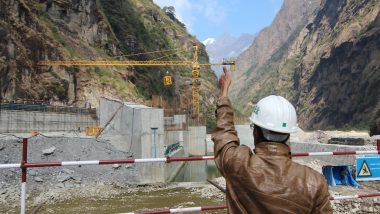Nepal has reinstated a deal with a Chinese state-owned company to build a USD 2.5 billion hydroelectric plant scrapped by the previous government. The agreement with the China Gezhouba Group Corporation (CGGC) to construct Nepal's largest hydro plant was abruptly cancelled by the outgoing government just weeks before a general election late last year.
But Prime Minister K.P. Sharma Oli, seen as China-friendly, pledged to revert the project to the Chinese company if he was elected to power in last year’s elections. Oli became prime minister in February after his Nepal Communist Party scored a landslide poll victory.
The news was confirmed by Nepali officials on Monday, as the new KP Oli government seeks massive infrastructure investment. "The decision to scrap the agreement with the Chinese company by the previous government was taken without any grounds," information minister Gokul Baskota told AFP.
"We decided to correct that, because Nepal doesn't have the capacity to build such a big project and funding is also challenging." The long-mooted 1,200 megawatt Budhi-Gandaki plant would nearly double Nepal's hydropower production. Nepal is a landlocked country and buys electricity from neighbouring India. Nepal's theoretical hydropower potential has been estimated to be around 84,000 MW, of which 43,000 MW has been identified as economically viable. Currently, Nepal's installed hydropower capacity is 753 MW. Beijing has been lobbying the new Communist government in Kathmandu to restore the contract since it took office in February, Baskota said.
Water-rich Nepal has a mountain river system that could make it an energy-producing powerhouse, but failure to develop its hydropower sector has weighed heavily on its ailing economy.
Nepal has awarded contracts for its mega hydropower projects to its two giant neighbours, India and China, but construction has been slow. Construction finally began on the USD 1.4 billion India-backed Arun Three hydropower plant earlier this year, 26 years after it was first proposed.
Nepal wants the reinstated project to be part of the Belt and Road Initiative (BRI), China's massive infrastructure drive at the centre of the Asian giant's push to expand its global footprint. Nepal signed up to the OBOR in May 2017.
But, critics say the contract should have been open for international bidding and warned of the risks of Chinese loans. Awarding such a lucrative contract in an opaque manner risked inflating the cost of the project "leading to a heavy national debt burden", tweeted former finance minister Ram Sharan Mahat.
Latest move on Budhigandaki hydro reflects quality of govt decision making.Awarding multi billion dollar project to a company on EPCF model in non- transparent manner without competition disregarding better options,bound to push project cost leading to heavy national debt burden.
— Ram Sharan Mahat (@ramsmahat) September 24, 2018
The Chinese company CGGC is currently building three smaller hydropower plants in Nepal and has completed one other, though critics have complained that these projects have run over time and budget.
Another Chinese firm, Three Gorges International Corporation, recently pulled out of a 750 megawatt hydropower project, citing financial concerns. Crucial infrastructure development in Nepal has flagged in the years of political paralysis that followed the end of the Maoist insurgency in 2006 and the overthrow of the monarchy two years later. (With Agency inputs)
(The above story first appeared on LatestLY on Sep 25, 2018 08:24 AM IST. For more news and updates on politics, world, sports, entertainment and lifestyle, log on to our website latestly.com).













 Quickly
Quickly


